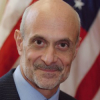Michael Chertoff

Michael Chertoff
Michael Chertoffis an American attorney who was the second United States Secretary of Homeland Security under Presidents George W. Bush andBarack Obama, and co-author of the USA PATRIOT Act. He previously served as a judge on the United States Court of Appeals for the Third Circuit, as a federal prosecutor, and as Assistant U.S. Attorney General. He succeeded Tom Ridge as United States Secretary of Homeland Security on February 15, 2005...
NationalityAmerican
ProfessionPublic Servant
Date of Birth28 November 1953
CountryUnited States of America
It's going to be in the hundreds, ... probably way too low.
I've known Rob for many years; he is an outstanding public servant and will be greatly missed here at the department. I appreciate the commitment and service he has shown in directing our border security efforts.
So, all during the '90s and, you know, for the first half of this decade, we had opportunities to get evacuation plans in place, better communications in place.
a systematic evaluation of the department's operations, policies and structures.
As we improve security, we ought to have the ability to begin to manage the risk by looking to communities that haven't gotten the help.
As you know, the president has established the 'White House Task Force on Hurricane Katrina Response.' He will meet with us tomorrow to launch this effort. The Department of Homeland Security, along with other Departments, will be part of the task force and will assist the administration with its response to Hurricane Katrina,
The world is not going to stop moving because we are very focused on Katrina. Part of the responsibility of the Department of Homeland Security is to deal with all hazards, everything that's out there, and to continue to be able to keep our eye on everything that may happen in the future,
You can't fly helicopters in a hurricane. You can't drive trucks in a hurricane.
The DHS programs supporting these teams already possess their own communications and aerial surveillance capabilities, such as helicopters and P-3 aircraft, ... Once in position, the teams will be able to relay up-to-the-minute, dependable information on which authorities could act confidently.
All I have to do is say, 'You are empowered to go fulfill the mission,' and it gets done,
The devastation and tragic loss of life caused by Hurricane Katrina earlier this week reinforce the urgency of our coalition's work,
You've got to make sure you've built the entire system so that once you apprehend people, you can hold them and then remove them in a prompt way.
And one of the things I want to say, Wolf, is we're 100 days from hurricane season, and we've got to start focusing on what we're going to do to make ourselves ready for the next hurricane.
I think the American public is rightly distressed about a situation in which they feel we do not have proper control over our borders, ... We need to have a comprehensive solution and one that really will work.